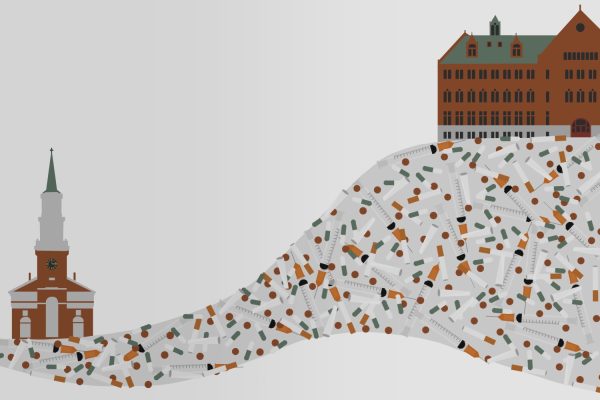Sanders’ fictitious compassionate socialism
In the 2000 presidential election, George W. Bush made popular the term “compassionate conservatism,” rightly regarded by ideological conservatives, among whom Bush is not, as an attack against the rest of the conservative movement.
Were they not, as they must have supposed, compassionate already?
And what does it mean to have a compassionate government? Surely that would be at odds with the conservative philosophy, which claims to disdain extraneous government services in the first place, such as Medicare and Medicaid.
Nevertheless, history tells us Bush’s “compassionate conservatism” was an effective marketing campaign. It polled well, and of course, he went on to win the election.
One should wonder though: Would a liberal ever call himself “compassionate?”
Everyone knows the Left is empathetic. Liberals are in sync, or have their chakras lined up, with the needs of the poor. When Republicans receive corporate donations they’re “bought”.
When Democrats benefit from corporations and unions, they’re exercising the will of the people, even though it may not be the will of an electrical worker forced into a union by a non-right-to-work state and made to pay mandatory dues that are then given to Democrats. The worker is much too stupid to recognize his own interest, which he might more easily discern with a free college education.
[aesop_quote type=”block” background=”#ffffff” text=”#000000″ width=”30%” align=”left” size=”1″ quote=”One should wonder though, Would a liberal ever call himself “compassionate?”” parallax=”off” direction=”right”]
Enter Bernie Sanders, the epitome of compassion and veritable man of the people (if you believe the collective hivemind on Facebook rendered by your annoying friends with too much time and too many opinions) needn’t call himself compassionate. He knows he is, mostly because everyone says so.
As a man of compassion, Sanders is duly adept at bestowing sainthood on other men of the revolution.
At the latest Democratic debate, Sanders was asked by Maria Elena Salinas if he regretted bestowing praise on Fidel Castro and the Sandinistas. Sanders avoided the question, responding with “the key issue here was whether the United States should go around overthrowing small Latin American countries. I think that that was a mistake….”
You wouldn’t have to put a gun to Sanders’ head to get him to talk about wealth inequality, but Sanders seemed legitimately evasive about Salinas’s question.
He later went on to wish, likely in vain, that Cuba would become democratic, but ultimately declined to open that can of worms, opting instead to praise Cuba’s healthcare system.
This was an odd thing to say given that 41.2 percent of Cuban hospital patients were classified as “undernourished” and 11.1 percent “severely undernourished,” according to a 2005 National Center for Biotechnology Information study.
Why should we want universal healthcare when we’re already light years ahead of Cuba, which has earned the praise of the compassionate Sanders?
In 1989, when Sanders took a sham tour of Cuba, he returned singing its praises: “I did not see a hungry child. I did not see any homeless people,” he told the Burlington Free Press. “Cuba today not only has free healthcare but very high quality health care.”
He likely never saw evidence of Cuba’s horrendous treatment of gays in its labor camp system, designed by college student-favorite Che Guevara, either — but he was visiting a nation whose civil and political rights are as functional as the Burlington housing market (Thanks, Bernie).
According to Freedomhouse.org, Cuba is rated as “not free,” receiving a seven out of seven for its political rights, and six out of seven for its civil liberties. Their ranking is weird, but seven is the worst score one can receive.
As Hillary Clinton rightly responded to Sanders in that debate, speaking of Cuban political values, “that is not the kind of revolution of values that I ever want to see anywhere.” Hillary could have gone further, noting that there is no such thing as a repressive regime that “has made some good advances in health care.”
[aesop_quote type=”pull” background=”#ffffff” text=”#000000″ width=”40%” align=”right” size=”1″ quote=”Why should we want universal healthcare when we’re already light years ahead of Cuba, which has earned the praise of the compassionate Sanders?” parallax=”on” direction=”left”]
On poverty, Sanders seems anything but compassionate. Responding to inquiry regarding his “racial blind spots,” he shared an anecdote about racism.
He then concluded: “So to answer your question, I would say, and I think it’s similar to what the secretary said; when you’re white, you don’t know what it’s like to be living in a ghetto,” he asserted. “You don’t know what it’s like to be poor,” he claimed, which is an odd thing to say when running for president in a country in which 19.7 million of the 46.7 million people in poverty are white, according to the 2014 Census.
But if we can discount white poverty, that’d be news to Sanders, who claimed in September of last year that, “We have more people living in poverty today than almost any time in the history of this country.” Not so.
By proving that whites aren’t acquainted with poverty, Sanders single-handedly lowered the American poverty rate from about 15 percent to about 8 percent, which would make intergalactic travel possible under a Sanders presidency, assuming he could also lower the speed of light.
If that’s not change you can believe in, try compassionate conservatism. It may seem silly, but compassionate socialism is a lie.






